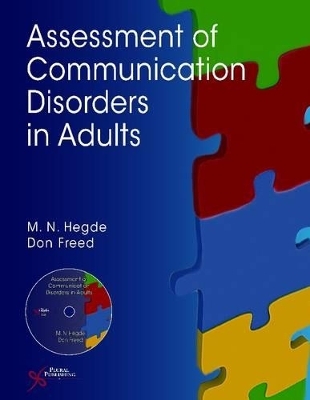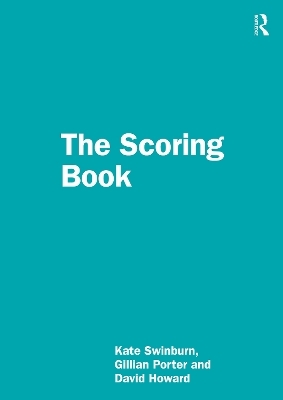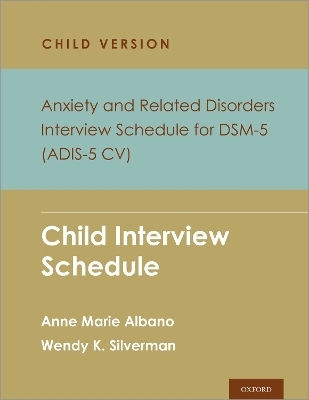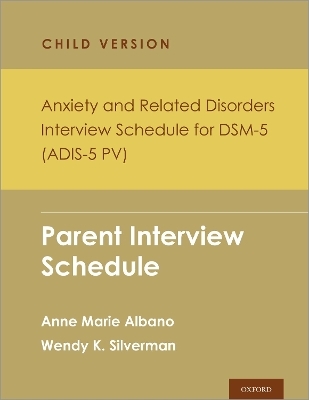
Assessment of Communication Disorders in Adults
Plural Publishing Inc
978-1-59756-414-4 (ISBN)
- Titel ist leider vergriffen;
keine Neuauflage - Artikel merken
M. N. Hegde, Ph.D. is Professor of Speech-Language Pathology in the Department of Communicative Disorders at California State University, Fresno. A highly regarded author in speech-language pathology, his books include leading texts in academic courses and valuable resources for clinicians. His books have been used in worldwide in speech-language pathology programs. Don Freed is chair of the Department of Communicative Disorders and Deaf Studies at California State University, Fresno. He received both his M.S. and Ph.D. from the University of Oregon. Prior to his Ph.D., he worked as a speech-language pathologist in acute care and rehabilitative medical facilities. He also worked as a research speech pathologist for three years at the Portland VA Medical Center. His research has primarily concentrated on adult language and motor speech disorders.
Preface PART I. Foundations of Assessment Chapter I. Assessment of Adults: An Overview Written Case History The Initial Clinical Interview Hearing Screening Orofacial Examination Diadochokinetic Tasks Speech-Language Sample Standardized Assessment Instruments Assessment of Functional Communication Assessment of Communication Quality of Life Postassessment Counseling Analysis and Integration of Assessment Results Assessment Report Chapter 2. Common Assessment Protocols Adult Case History Protocol Instructions for Conducting the Orofacial Examination in Adults: Observations and Implications Orofacial Examination and Hearing Screening Protocol Diadochokinetic Assessment Protocol for Adults Functional Communication Assessment Protocol Communication Quality of Life Assessment Protocol Adult Assessment Report Outline PART II. Assessment of Motor Speech Disorders in Adults Chapter 3. Assessment of Apraxia of Speech (AOS): Resources Description of AOS Epidemiology and Etiology of AOS Overview of Assessment of AOS Screening for AOS Standardized Tests for AOS Analysis and Integration of Assessment Results Diagnostic Criteria and Differential Diagnosis Postassessment Counseling Chapter 4. Assessment of Apraxia of Speech (AOS): Protocols Overview of AOS Protocols Assessment of AOS Interview Protocol AOS Assessment Protocol 1: Oral Apraxia AOS Assessment Protocol 2: Speech Production in AOS AOS Assessment Protocol 3: Comparing Alternate Motion Rates (AMRs) and Sequential Motion Rates (SMRs) AOS Assessment Protocol 4: Connected Speech Chapter 5. Assessment of Dysarthria: Resources Types of Dysarthria Epidemiology of Dysarthria Etiology of Dysarthria Overview of Dysarthric Speech Overview of Assessment of Dysarthria Standardized Tests for Dysarthria Diagnostic Criteria and Differential Diagnosis Postassessment Counseling Chapter 6. Assessment of Dysarthria: Protocols Overview of Dysarthria Protocols Assessment of Dysarthria: Interview Protocol Dysarthria Assessment Protocol 1. Orofacial Examination Dysarthria Assessment Protocol 2. Respiratory-Phonatory Function Dysarthria Assessment Protocol 3. Speech Production (Articulation) Dysarthria Assessment Protocol 4 . Production of Prosody Dysarthria Assessment Protocol 5 . Resonance PART III. Assessment of Aphasia Chapter 7. Assessment of Aphasia: Resources Epidemiology of Aphasia Etiology and Neuropathology of Aphasia Characteristics of Aphasia Types of Aphasia Overview of Assessment Screening for Aphasia Standardized Tests for Aphasia Assessment of Speech Production Assessment of Narrative and Conversational Skills Assessment of Functional Communication Quality of Life Assessment Assessment of Bilingual or Multilingual Patients Analysis and Integration of Assessment Results Postassessment Counseling Chapter 8. Assessment of Aphasia: Protocols Overview of Aphasia Protocols Aphasia Interview Protocol Auditory Comprehension Assessment Protocol Connected Speech and Grammatical Skills Assessment Protocol Repetition and Echolalia Assessment Protocol Naming and Word Finding Assessment Protocol Fluency Assessment Protocol Reading, Writing, and Calculation Assessment Protocol Aphasia Summative Diagnostic Protocol PART IV. Assessment of Right-Hemisphere Syndrome Chapter 9. Assessment of Right-Hemisphere Syndrome (RHS): Resources Functions of the Left and the Right Hemispheres Epidemiology of RHS Etiology and Neuropathology of RHS Neurological and Neuromotor Consequences of RHS Overview of Assessment Screening for RHS Standardized Tests for RHS Analysis and Integration of Assessment Results RHS Assessment Tasks in Chapter 10 Postassessment Counseling Chapter 10. Assessment of Right Hemisphere Syndrome (RHS) Protocols Overview of RHS Protocols Assessment of RHS: Interview Protocol RHS Assessment Protocol 1: Visual Neglect and Visuospatial Skills RHS Assessment Protocol 2: Communication Skills RHS Assessment Protocol 3: Abstract Language PART V. Assessment of Dementia Chapter 11. Assessment of Dementia: Resources Overview of Dementia Epidemiology of Dementia General Etiology and Pathology of Neurodegenerative Diseases Treatment of Irreversible and Reversible Dementia Dementia of the Alzheimer Type Other Forms of Dementia Overview of Dementia Assessment Screening and Diagnostic Tests for Dementia Assessment of Dementia in Ethnoculturally Diverse Adults Diagnostic Criteria and Differential Diagnosis Postassessment Counseling Chapter 12. Assessment of Dementia: Protocols Overview of Dementia Protocols Assessment of Dementia: Interview Protocol Dementia Screening Protocol 1 Dementia Screening Protocol 2 Dementia Assessment Protocol 1: Mental Status and Intellectual Functioning Dementia Assessment Protocol 2: Communication Abilities Dementia Assessment Protocol 3: General Behavioral Evaluation PART VI. Assessment of Traumatic Brain Injury Chapter 13. Assessment of Traumatic Brain Injury (TBI): Resources Epidemiology of TBI Etiology of TBI Penetrating Brain Injuries Nonpenetrating Brain Injuries Primary and Secondary Effects of TBI Recovery from TBI Neurobehavioral Effects of TBI Communicative Disorders Associated with TBI Assessment of TBI Overview of Assessment Screening for TBI Diagnostic Assessment Assessment of Consciousness and Responsiveness Assessment of Memory and Reasoning Skills Assessment of Communicative Deficits Associated with TBI Postassessment Counseling Chapter 14. Assessment of Traumatic Brain Injury (TBI): Protocols Overview of TBI Protocols Assessment of TBI: Interview Protocol TBI Assessment Protocol 1: Orientation and Memory TBI Assessment Protocol 2: Perception and Reasoning Skills TBI Assessment Protocol 3: Communication Skills PART VII. Assessment of Fluency Disorders Chapter 15. Assessment of Fluency Disorders: Resources An Overview of Fluency and its Disorders in Adults Epidemiology of Stuttering in Adults Definition and Measurement of Stuttering Additional Features of Stuttering Diagnostic Criteria for Stuttering Assessment of Stuttering Neurogenic Stuttering Cluttering Assessment of Quality of Life and Functional Communcation Postassessment Counseling Chapter 16. Assessment of Fluency Disorders: Protocols Overview of Fluency Assessment Protocols Interview Protocol Dysfluency Measurement Protocol Stuttering Variability Assessment Protocol Associated Motor Behaviors Assessment Protocol Avoidance Behaviors Assessment Protocol Neurogenic Stuttering Assessment Protocol Cluttering Assessment Protocol Fluency Quality of Life Assessment Protocol PART VIII. Assessment of Voice Chapter 17. Assessment of Voice: Resources Epidemiology and Ethnocultural Variables Voice Disorders in Adults Mutism Aphonias Dysphonias Spasmodic Dysphonia Causes of Voice Disorders Overview of the Assessment Process Clinical Assessment of Voice Instrumental Assessment of Voice Quality of Life Assessment Assessment of Voice in Ethnoculturally Diverse Adults Postassessment Counseling Chapter 18. Assessment of Voice: Protocols Overview of Voice Protocols Assessment of Voice: Interview Protocol Adult Voice Evaluation Protocol Resonance Assessment Protocol Vocal Abuse and Misuse Assessment Protocol Voice Handicap Assessment Protocol Voice Quality of Life Assessment Protocol References Index
| Erscheint lt. Verlag | 1.3.2011 |
|---|---|
| Zusatzinfo | B/W |
| Verlagsort | San Diego |
| Sprache | englisch |
| Maße | 216 x 279 mm |
| Gewicht | 1157 g |
| Themenwelt | Geisteswissenschaften ► Psychologie ► Biopsychologie / Neurowissenschaften |
| Medizin / Pharmazie ► Gesundheitsfachberufe ► Logopädie | |
| ISBN-10 | 1-59756-414-1 / 1597564141 |
| ISBN-13 | 978-1-59756-414-4 / 9781597564144 |
| Zustand | Neuware |
| Haben Sie eine Frage zum Produkt? |
aus dem Bereich


